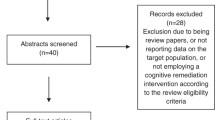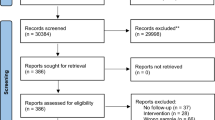Abstract
Objective
To investigate the contribution of processing speed in the prediction of various domains of outcome in psychosis.
Method
Data were drawn from the UK700 Case Management Trial of 708 patients with chronic psychotic illness. Regression analyses were applied to investigate cross-sectional and longitudinal associations between processing speed at baseline and measures of service use, social outcome and subjective outcome, taking into account current psychopathology and adjusting for baseline values of the outcome measure.
Results
Cross-sectionally, processing speed was associated with all three domains of outcome, although only associations in the social and subjective outcome domain remained significant after controlling for psychopathology and the effects differed between and within domains of outcome. Prospectively, only the subjective outcome measure of number of met and unmet needs (CAN) was weakly associated with baseline neurocognitive performance after adjustment for baseline needs. Other associations disappeared after adjustment for the baseline measure of outcome and/or baseline psychopathology.
Conclusion
The finding of weak cross-sectional associations in the absence of specific and unconfounded longitudinal associations suggests that processing speed is an independent dimension of disease severity rather than a causal factor impacting on social outcome. Nevertheless, longitudinal change in patient reported needs may be weakly sensitive to baseline cognitive impairment.
Similar content being viewed by others
References
Addington J, McCleary L, Munroe-Blum H (1998), Relationship between cognitive and social dysfunction in schizophrenia. Schizophr Res 34(1–2):59–66
Addington J, Saeedi H, Addington D (2005) The course of cognitive functioning in first episode psychosis: changes over time and impact on outcome. Schizophr Res 78(1):35–43
Breier A et al. (1992) Course of illness and predictors of outcome in chronic schizophrenia: implications for pathophysiology. Br J Psychiatry 161(Suppl 18):38–43
Brekke JS, Kohrt B, Green MF (2001) Neuropsychological functioning as a moderator of the relationship between psychosocial functioning and the subjective experience of self and life in schizophrenia. Schizophr Bull 27(4):697–708
Bryson G, Bell MD (2003) Initial and final work performance in schizohrenia: cognitive and symptom predictors. J Nerv Ment Dis 191(2):87–92
Burns T et al. (1999) Intensive versus standard case management for severe psychotic illness: a randomised trial. UK 700 Group. Lancet 353(9171):2185–2189
Carlsson R et al. (2006) Neuropsychological functions predict 1- and 3-year outcome in first-episode psychosis. Acta Psychiatr Scand 113(2):102–111
Dickinson D et al. (2004) General and specific cognitive deficits in schizophrenia. Biol Psychiatry 55:826–833
Dickinson D, Coursey RD (2002) Independence and overlap among neurocognitive correlates of community functioning in schizophrenia. Schizophr Res 56(1–2):161–170
Fujii DE, Wylie AM (2002) Neurocognition and community outcome in schizophrenia: long-term predictive validity. Schizophr Res 59:219–223
Gilvarry CM et al. (2001) Neuropsychological performance of psychotic patients in community care: results from the UK700 study. Acta Psychiatr Scand Suppl 408:81–91
Gold JM et al. (2002) Cognitive correlates of job tenure among patients with severe mental illness. Am J Psychiatry 159(8):1395–1402
Green MF (1996) What are the functional consequences of neurocognitive deficits in schizophrenia? Am J Psychiatry 153(3):321–330
Green MF et al. (2000) Neurocognitive deficits and functional outcome in schizophrenia: are we measuring the “Right Stuff”? Schizophr Bull 26(1):119–136
Green MF, Kern RS, Heaton RK (2004) Longitudinal studies of cognition and functional outcome in schizophrenia: implications for MATRICS. Schizophr Res 72(1):41–51
Hassiotis A et al. (2001) Intellectual functioning and outcome of patients with severe psychotic illness randomised to intensive case management. Report from the UK700 trial. Br J Psychiatry 178:166–171
Holthausen EA et al. (2007) Predictive value of cognition for different domains of outcome in recent-onset schizophrenia. Psychiatry Res 149(1–3):71–80
Jablensky A, Schwartz R, Tomov T (1980) WHO collaborative study of impairments and disabilities associated with schizophrenic disorders: a preliminary communication. Objective and methods. Acta Psychiatr Scand Suppl 285(62):152–163
Jacobsson L et al. (1978) The comprehesive psychopathological rating scale—CPRS—in patients with schizophrenic syndromes. Inter-rater reliability and in relation to Martens’ S-scale. Acta Psychiatr Scand Suppl 271:39–44
Lehman AF, Ward NC, Linn LS (1982) Chronic mental patients: the quality of life issue. Am J Psychiatry 139(10):1271–1276
Lezak M (1995) Neuropsychological assessment, 3rd edn. Oxford University Press, New York
Lieberman JA et al. (1996) Factors influencing treatment response and outcome of first-episode schizophrenia: implications for understanding the patholophysiology of schizophrenia. J Clin Psychiatry 57(Suppl 9):5–9
Lysaker PH et al. (2005) Relationship of impaired processing speed and flexibility of abstract thought to improvements in work performance over time in schizophrenia. Schizophr Res 75(2–3):211–218
Malla AK et al. (2002) Symptoms, cognition, treatment adherence and functional outcome in first-episode psychosis. Psychol Med 32(6):1109–1119
Malla A, Payne J (2005) First-episode psychosis: psychopathology, quality of life, and functional outcome. Schizophr Bull 31(3):650–671
Mc Guffin P, Farmer A, Harvey I (1991) A polydiagnostic application of operational criteria in studies of psychotic illness: development and reliability of the OPCRIT system. Arch Gen Psychiatry 48:764–770
McGurk SR, Meltzer HY (2000) The role of cognition in vocational functioning in schizophrenia. Schizophr Res 45(3):175–184
Metcalfe C et al. (2005) Intensive case management for severe psychotic illness: is there a general benefit for patients with complex needs? A secondary analysis of the UK700 trial data. Soc Psychiatry Psychiatr Epidemiol 40(9):718–724
Milev P et al. (2005) Predictive values of neurocognition and negative symptoms on functional outcome in schizophrenia: a longitudinal first-episode study with 7-year follow-up. Am J Psychiatry 162(3):495–506
Nelson HE, Willison JR (1991) The revised national adult reading test manual, 2nd edn. Windsor, NFER-Nelson, UK
Norman RM et al. (1999) Symptoms and cognition as predictors of community functioning: a prospective analysis. Am J Psychiatry 156(3):400–405
Norman RMG et al. (2005) Social support and three-year symptom and admission outcomes for first-episode psychosis. Schizophr Res 80:227–234
Oliver JP et al. (1997) Measuring the quality of life of severely mentally ill people using the Lancashire quality of life profile. Soc Psychiatry Psychiatr Epidemiol 32(2):76–83
van Os J et al. (1999) To what extent does symptomatic improvement result in better outcome in psychotic illness? UK700 Group. Psychol Med 29(5):1183–1195
van Os J, Wright P, Murray RM (1997) Risk factors for emergence and persistence of psychosis. In: Weller M, Van Kammen D (Eds) Progress in clinical psychiatry. W. B. Saunders Company LTD, London, pp 152–206
Phelan M et al. (1995) The Camberwell assessment of need: the validity and reliability of an instrument to assess the needs of people with severe mental illness. Br J Psychiatry 167(5):589–595
Prouteau A et al. (2005) Cognitive predictors of psychosocial functioning outcome in schizophrenia: a follow-up study of subjects participating in a rehabilitation program. Schizophr Res 77(2–3):343–353
Reitan RM (1958) Validity of the trail making test as an indicator of organic brain dysfunction. Percept Mot Skills 8:271–276
Robinson DG et al. (2004) Symptomatic and functional recovery from a first episode of schizophrenia or schizoaffective disorder. Am J Psychiatry 161(3):473–479
Rosenman S et al. (2003) Dimensional vs. categorical diagnosis in psychosis. Acta Psychiatr Scand 107:378–384
Smith TE et al. (1999) The relative influences of symptoms, insight, and neurocognition on social adjustment in schizophrenia and schizoaffective disorder. J Nerv Ment Dis 187(2):102–108
Sota TL, Heinrichs RW (2004) Demographic, clinical, and neurocognitive predictors of quality of life in schizophrenia patients receiving conventional neuroleptics. Compr Psychiatry 45(5):415–421
Spitzer RL, Endicott J, Robins E (1978) Research diagnostic criteria: rationale and reliability. Arch Gen Psychiatry 35(6):773–782
Stirling J et al. (2003) Neurocognitive function and outcome in first-episode schizophrenia: a 10-year follow-up of an epidemiological cohort. Schizophr Res 65(2–3):75–86
Tyrer P et al. (1999) Intensive case management for psychotic patients with borderline intelligence. UK 700 Group. Lancet 354(9183):999–1000
UK700Group (1999) Predictors of quality of life in people with severe mental illness. Study methodology with baseline analysis in the UK700 trial. Br J Psychiatry 175:426–432
UK700Group (1999) Comparison of intensive and standard case management for patients with psychosis. Rationale of the trial. UK700 Group. Br J Psychiatry 174:74–78
Verdoux H et al. (2002) Social and clinical consequences of cognitive deficits in early psychosis: a two-year follow-up study of first-admitted patients. Schizophr Res 56(1–2):149–159
WHO (1992) WHO coordinated multi-center study on the course and outcome of schizophrenia. WHO, Geneva
Acknowledgments
The UK700 trial was funded by grants from the UK Department of Health and NHS Research and Development.
Author information
Authors and Affiliations
Consortia
Corresponding author
Additional information
The UK700 Group is a collaborative study team involving four clinical centres—Manchester: Tom Butler, Francis Creed, Janelle Fraser, Richard Gater, Peter Huxley, Nick Tarrier, Theresa Tattan. Kings/Maudsley, London: Tom Fahy, Catherine Gilvarry, Kwame Mc Kenzie, Robin Murray, Jim van Os, Elizabeth Walsh. St Marry’s/St Charles, London: John Green, Anna Higgit, Elizabeth van Horn, Donal Leddy, Patricia Thornton, Peter Tyrer. St George’s, London: Rob Bale, Tom Burns, Matthew Fiander, Kate Harvey, Andy Kent, Chiara Samele. York (Health Economics Centre) Sarah Byford, David Torgerson, Ken Wright. Statistical Centre, London: Simon Thompson, Ian White.
Rights and permissions
About this article
Cite this article
Jabben, N., van Os, J., Burns, T. et al. Is processing speed predictive of functional outcome in psychosis?. Soc Psychiat Epidemiol 43, 437–444 (2008). https://doi.org/10.1007/s00127-008-0328-y
Received:
Accepted:
Published:
Issue Date:
DOI: https://doi.org/10.1007/s00127-008-0328-y




